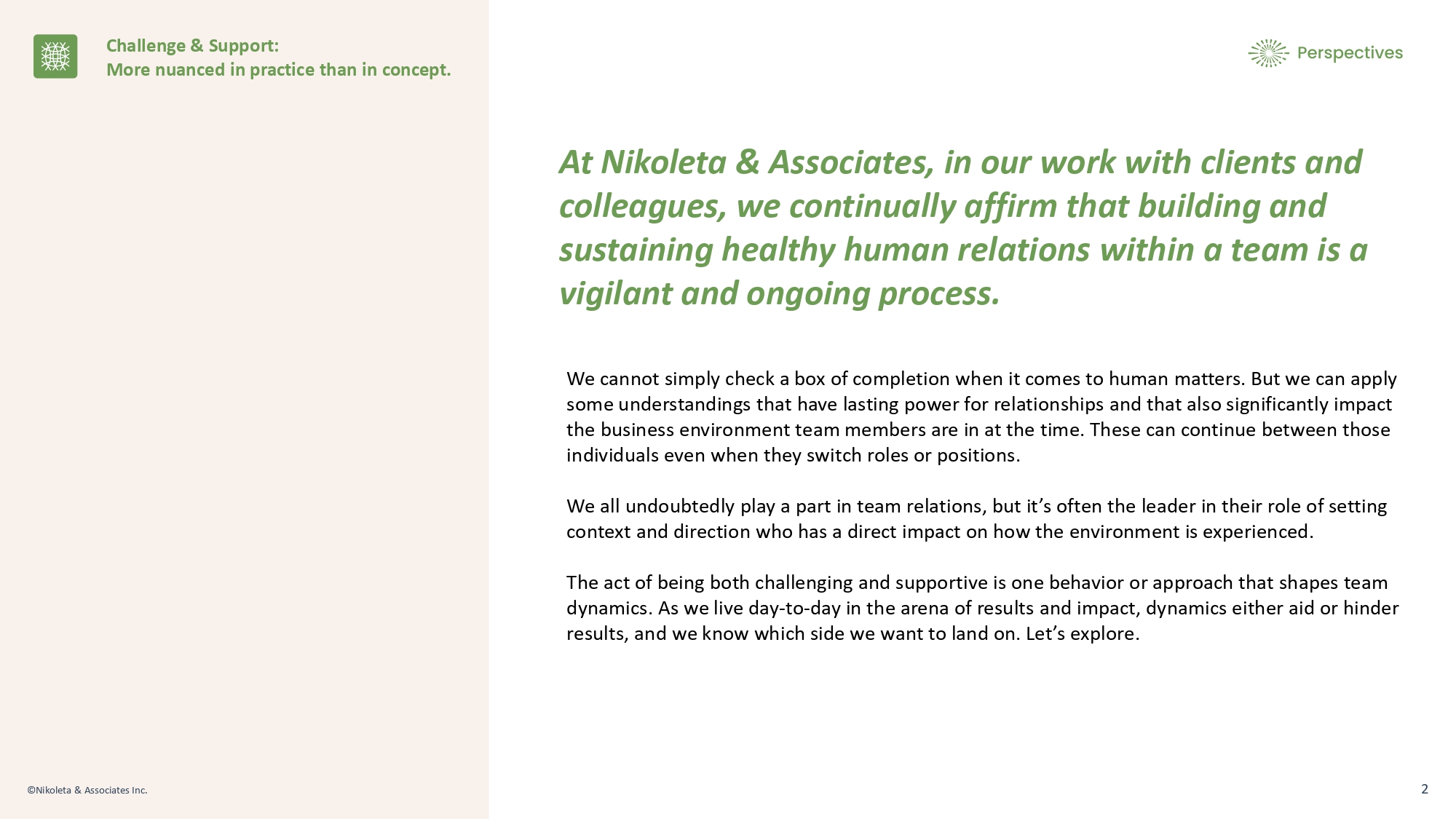Perspective
Challenge & Support: more nuanced in practice than in concept


At Nikoleta & Associates, in our work with clients and colleagues, we continually affirm that building and sustaining healthy human relations within a team is a vigilant and ongoing process.
We cannot simply check a box of completion when it comes to human matters. But we can apply some understandings that have lasting power for relationships and that also significantly impact the business environment team members are in at the time. These can continue between those individuals even when they switch roles or positions.
We all undoubtedly play a part in team relations, but it’s often the leader in their role of setting context and direction who has a direct impact on how the environment is experienced.
The act of being both challenging and supportive is one behavior or approach that shapes team dynamics. As we live day-to-day in the arena of results and impact, dynamics either aid or hinder results, and we know which side we want to land on. Let’s explore.
Challenge
When we think of challenging one another, it is not about being right or having something clever to say, or the “Let me challenge you on your thinking” phrase. These behaviors are largely present in our day-to-day interactions and are good to explore in future segments for their role in team and organization dynamics. We frame challenge as setting a project or goal that is experienced as challenging but achievable by the person or team involved. These experiences tend to be where learning is part of the mix. This challenge is about seeing more possibilities, looking beyond the near-term outcome, and/or the current understanding of the individuals involved. This can even be considered a vision contextualized to the topic or domain.
With the challenge now engaged and in motion, it is also the role of a leader to be available to adjust the desired outcomes, explore strategies, ways to move forward, and celebrate the small things along the way.
Much of our work is spent with our clients preparing for an event, presentation, or key milestone in a plan. As we know, although we remember these key events, most of our lives are spent on the way somewhere. Those actively supporting us along the way, in business or in life, are those we remember far beyond the event itself.
Support
We are always enabling something. It’s best to be conscious about what that is and if it’s working for what we want to create.
In business, results pay bills. And yet sustainable results, as we all know, require many other things, one of which is learning. As a leader, one of your roles is to enable both performance and learning outcomes. And they are quite different.
Performance speaks much to our achievement orientation, feels awesome when we get straight A’s, a 4.0 GPA, promotions, land a $1M deal, etc. and these goals matter. When we hit it out of the park, we are rocking it! And the team is giving thumbs-up, emoticon-ing around! The experience of authentically learning is quite different. It can be experienced as slow, by the achievement-oriented individual, and perhaps the coach-leader who is teaming up on the skill. And as the learning becomes part of our flow, bursts of achievement are possible.
We often say we have been taught to achieve, not learn, and we are busy learning how to learn as adults. Authentic learning is not a linear path and thus remains a windy path. Even by the learner, learning can be inconvenient as they look to deliver quickly and impactfully. Authentic learning, for us, means:
An internalization of our learning, an understanding of how we arrived there, said another way, our mastery. It’s not solely about a template or repeating, etc. It can include elements of these, but it becomes more a part of what we now offer and how we operate, more of an integration than an add-on.
This is where challenge and support tend to matter equally if not more than performance. Supporting the learning of your team, with the understanding that most of our learning is often on-the-job, puts a different frame for a leader to see their day: to deliver results and build capability. This equation is, of course, dependent on many factors: where the business is, what it needs, what it can offer, etc. Thus, we often hear about the value of coachability and learning ability in start-up conversations.
The role of culture
Challenge and support in leadership matters is multi-layered as the culture of the organization is the context within which we all live, not just in our teams.
Think of the traditional debrief: what went well, what did not generally go well around an outcome that is now past. And if the outcome was a success, we tend to move on and offer “feedback” in passing on things that did not go well. An alternative can be: We always do debriefs at key times of the year or at significant milestones such as large events and program launches. They can include what went well and did not, and extend to: What was our vision? Did we have one? What did we learn along the way for our mastery? What did this experience inspire as a team and as individuals?
Take Forward
As leaders our primary goal is to enable the success of others. As business at its best is a mutually beneficial and interest game, leaders also gain from this approach.
The act of being challenging and supportive starts with our conversations with ourselves. How are we both challenging and supporting ourselves? In our day-to-day collaborations, we continue to see that those leaders and teams that engage and re-commit to a way of operating that includes challenge, support, learning and performance can envision sustainable results. And although never guaranteed, it is at least collectively imagined as an act, not just an idea.















